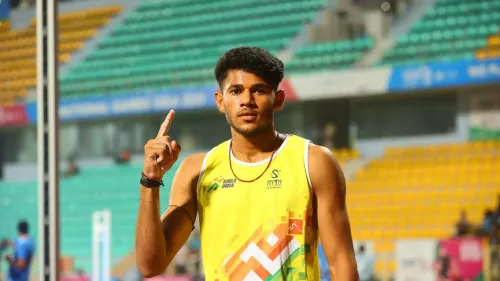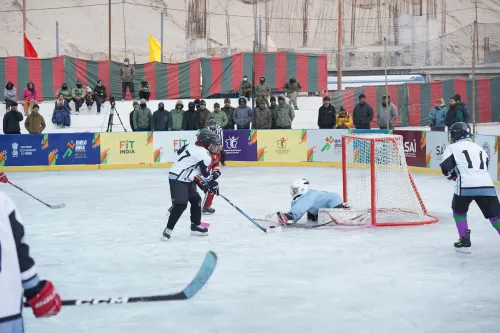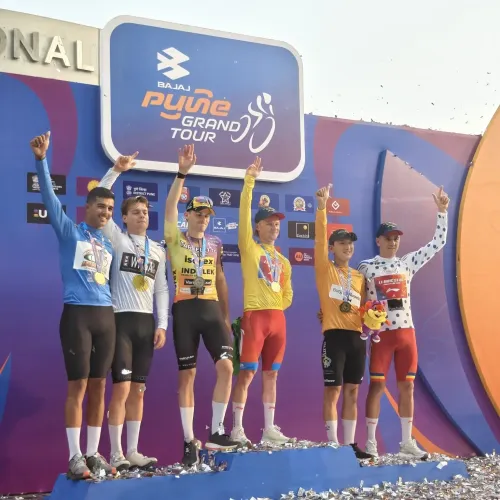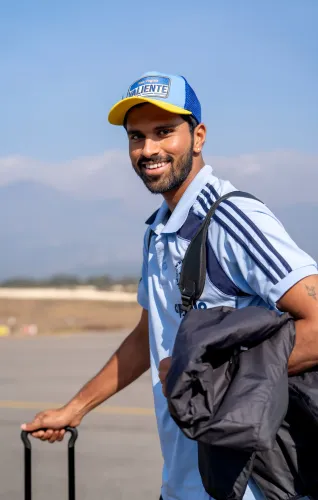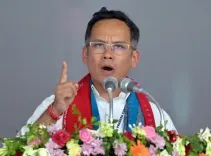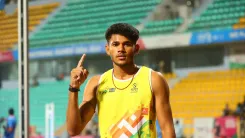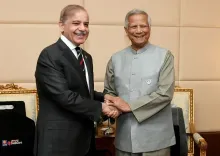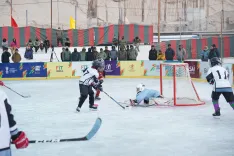How Are India’s Kho Kho Champions from Odisha to Assam Lighting Up Their Families?
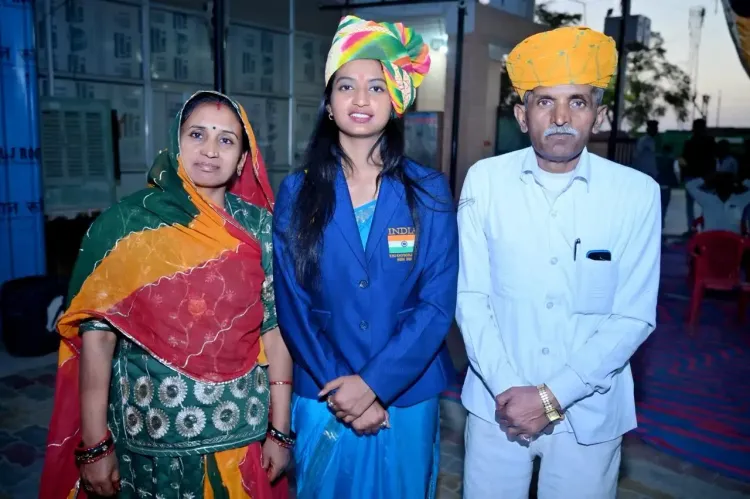
Synopsis
Key Takeaways
- Kho kho is empowering women across India.
- Success stories from diverse regions inspire others.
- Celebrating Diwali reflects personal achievements.
- Traditional views on women in sports are changing.
- Community support plays a crucial role in these journeys.
New Delhi, Oct 16 (NationPress) As the Diwali lights shimmer across India this year, from the tribal regions of Odisha to the sandy villages of Rajasthan and the chawls of Pune, some families are observing a novel form of Lakshmi Puja, one not defined by gold coins or rituals, but by pride and tears of joy.
Their daughters, once told that sports were not for women, have now emerged as symbols of empowerment through the game of kho kho.
These remarkable young women - Magai Majhi from Odisha, Nirmala Bhati from Rajasthan, Priyanka Ingle from Maharashtra, and Ranjana Sarania from Assam, have redefined what it means to bring prosperity to their homes.
They embody India’s ascent in traditional sports, and in their parents’ eyes, they are the true goddesses of wealth—not for their earnings, but for their transformations.
In the tribal village of Kasnadara in Rayagada, Odisha, where fields meet dense forests, the festival of lights was once a modest celebration. However, this year, diyas will shine brighter in the home of Budhavari Majhi, mother of 21-year-old Kho Kho World Cup star Magai Majhi.
Budhavari raised Magai alone after her husband's passing when Magai was merely a month old. Defying the skepticism of villagers who questioned the merit of sending girls to hostels and sports camps, she remained steadfast. “In our tribal village, we do not usually celebrate Diwali with extravagance,” she mentioned. “But now it is a celebration. To me, my daughter is my Lakshmi, and she has made my Diwali exceptional with her accomplishments. She has brought fame to our village, state, and country. I am filled with pride thinking of her success.”
Her pride resonates beyond her door. Today, parents who once doubted her choices now seek her guidance on helping their own daughters pursue sports. Humble in her achievements, Magai smiles as she shares, “Many people from my village and district ask me how to support their daughters to become like me. It’s truly a huge compliment.”
Approximately 1600 kilometers away in Parewadi village, Rajasthan, Geeta Devi lights a diya near the family shrine. Her daughter, Nirmala Bhati, was once just another girl playing barefoot in the fields. Now she stands as Rajasthan’s first international kho kho champion and the Best Player of the Tournament at the 2025 Kho Kho World Cup.
“Our lives have transformed,” Geeta Devi expresses, her voice thick with emotion. “Previously, it was boys who brought glory to the family, but our daughter has brought us fame. In our society, women traditionally step out in pardah, yet now, due to her success, I’ve witnessed a shift in perception. One elder remarked, ‘Daughters like Nirmala are worth more than a hundred sons.’ What greater gift could we ask for this Diwali?”
Her husband, Om Prakash Bhati, a proud father in his seventies, nods in agreement. “We perform Lakshmi Puja during Diwali,” he softly states. “But our daughter is our true Lakshmi. She has brought honor to our family and village, and everyone is proud of her. She inspires other girls who now aspire to step out of pardah and excel in education and sports.”
Nirmala’s journey from skepticism to stardom signifies a quiet revolution in India’s rural heartlands, where daughters once bound by tradition now carry the torch of pride for their communities.
In a small chawl in Dighi, Pimpri-Chinchwad, Savita and Hanumant Ingle prepare for Diwali in the traditional Maharashtrian style; with Puran Poli, new clothes, and oil lamps. However, this year, their celebration has a more profound glow. Their 25-year-old daughter, Priyanka Ingle, is not just any kho kho player; she is the captain of India’s World Cup-winning team and one of the nation’s most decorated kho kho athletes.
Savita, who manages a small ladies’ item shop, remarks, “In Maharashtra, we celebrate Diwali with great enthusiasm. We honor Goddess Lakshmi and indulge in special dishes like Puran Poli. But for us, our daughter has made our Diwali remarkable. Her accomplishments have made this possible. My daughter is my Lakshmi. Because of her, our financial situation has improved, and our societal stature has elevated.”
Priyanka’s journey from a chawl to a government office, where she now serves as an Income Tax Officer, is a testament to resilience and faith. Her father, Hanumant, who operates a modest water purifier shop, quietly adds, “We once worried about her future. Now, people recognize us because of her. What more could a parent desire?”
Vimala Sarania's home remains dimly lit this Diwali. Their state mourns the loss of cultural icon Zubeen Garg, one of the most celebrated figures in the Indian music scene, leading to subdued festivities. Yet for Vimala, her 20-year-old daughter Ranjana, who represented India at the 4th Asian Kho Kho Championship in 2023, brings a different kind of light.
“We are not celebrating Diwali this time,” Vimala states. “But our true celebration occurs on the kho kho field. We are proud that our daughter plays for India.”
For families like the Saranias, pride has replaced pomp. Their daughter’s success, achieved through determination and community support, has inspired girls across Assam’s Bodoland region to embrace the sport.
Across these four states, Odisha, Rajasthan, Maharashtra, and Assam, a common thread emerges: the belief that empowerment, when born from struggle and conviction, is the truest form of worship.
Kho kho, once confined to school grounds and village dust, has transformed into a bridge linking tradition with change. For these families, it is not merely a sport; it is a symbol of transformation, a field where daughters have reclaimed their rightful place in India’s narrative.


